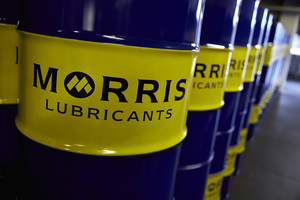

|
Edward Lowton
Editor |


|
| Home> | Plant, Process & Control | >Lubricants | >Hydraulic oil: The critical component |
Hydraulic oil: The critical component
20 September 2023
There are a range of factors to consider when selecting hydraulic oils, while end-users should weigh-up whether selecting a seemingly cheap hydraulic oil will deliver the performance required, says Adrian Hill

HYDRAULIC OILS are a critical system component, but inferior quality hydraulic oils will lead to poor performance and will cause expensive damage and equipment downtime. Hydraulic systems are employed in a multitude of applications, operating in a wide variety of working conditions. Therefore, consistent system performance depends on the quality of the hydraulic oil used.
Functions of a hydraulic oil
Within a hydraulic system, the hydraulic oil has four main important functions:
- To act as an energy transfer medium
- To lubricate and protect system components
- To transfer and dissipate heat
- To seal small clearances between moving parts
To deliver these functions effectively, hydraulic oils have to be formulated carefully with high quality base fluids and performance additives.
Viscosity
In the main, hydraulic oils tend to be referred to by their viscosity (or thickness), i.e., 32, 46 or 68. These are the most common ISO classification grades. However, this only tells part of the story as they will also be expected to have many other performance features to fully protect the equipment.
Operating temperatures
Hydraulic oils must perform consistently over the equipment’s operating temperature and load range, allowing precise control when needed. They must also be formulated using quality base oils that maintain a good working viscosity, enabling pumps to work efficiently.
Where equipment is operating in applications with extremes of temperature, high-performance hydraulic oils are required to cope with these varying conditions. This is achieved using polymer technology that allows the oil to flow at low temperatures but delivers effective working pressure when the equipment is hot and working hard.
Component protection
The heart of any hydraulic system is the pump, and this is where correct lubrication is absolutely essential. Common designs include rotary vane, gear and variable displacement piston pumps. Each design has specific lubrication requirements and hydraulic oils are formulated to address these various operational demands.
Hydraulic oils are also treated to ensure they can withstand high temperatures for prolonged periods of time without breaking down and causing deposits in the system. They will also have the ability to combat rusting or corrosion of components which can occur due to the ingress of airborne moisture or the working environment.
Mechanical churning of the oil can cause foaming which in turn results in 'sponginess' and poor hydraulic response and accelerated wear. To prevent this anti-foam additives are also incorporated.
Cleanliness
Pumps, control valves and pressure relief valves are all machined with fine tolerances and are therefore susceptible to contamination within the system. Harmful solid matter can be removed safely by a filter or filters, however, even contamination by particles invisible to the naked eye can cause damage and this can be introduced from new oil. New oil does not necessarily mean clean oil and it is important that any oil is supplied having been filtered correctly at the point of manufacture and into clean and dry containers or bulk delivery units.
Main types of hydraulic oil
Hydraulic oils can be formulated with different base oil types depending on the final application. In general, mineral oil-based formulations, with a correctly balanced additive system, form the majority of products on the market. But variations do exist to provide a tailored approach.
If fire resistance is required there are families of base oils that are non-combustible, or formulations that are self-extinguishing, i.e., they may contain water.
Biodegradable options are also available, either based on vegetable oils or synthetic esters that mimic vegetable oil, where environmental impact has to be taken onto consideration. In some specialised applications, food safe maybe specified and again the appropriate base oil must be selected.
In summary, not all hydraulic oils are equal and poor choice will lead to expensive repairs and the inconvenience of downtime. Price shouldn’t be the only factor when choosing a hydraulic fluid as it can prove to be a false economy.
Adrian Hill is technology manager at Morris Lubricants
For more information:
Tel: 01743 232200
- Lubricant support from online chat robot
- Lubricants, coolants and oil analysis
- Remote monitor for automatic lubrication systems
- Oil consumption cut
- Boosting the life of wire rope assets
- Lubrication equipment helps boost life of wire rope assets
- Interflon obtains ISO 21469 certification
- New developments and webshop discount
- Oil sampling: Benefits for preventative maintenance
- New corrosion preventative product launched



















